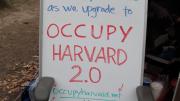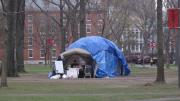The Occupy Harvard movement, which placed its tent encampment in Harvard Yard on November 9—prompting the University to lock the gates and restrict Yard access to University ID holders and authorized guests, to balance the interests of both resident students and the protestors—has moved on. The tents were removed during the weekend, leaving in place an information tent and a tarp-covered geodesic dome (a structure developed by R. Buckminster Fuller ’17), and a sign asking passersby to "Please pardon our appearance as we upgrade to Occupy Harvard 2.0" (presumably something more virtual and networked than tenting out in the wintry Yard).
During talks between Harvard and Occupy representatives, the University discussed next steps; in a subsequent e-mail, the University laid out its view of how to proceed, including reopening general access to the Yard effective December 22. The University guidelines reflect both the departure of freshmen from their Yard dormitories with the end of exams and the beginning of the official winter recess, and the obvious winding-down of Occupy movement presences in other locations, including Boston. According to the text of the message e-mailed by the University to an Occupy representative (provided to Harvard Magazine by the University):
Following up on our meeting, the University welcomes the decision of Occupy Harvard to remove most of the tents it had erected in Harvard Yard. In light of the voluntary removal of most of the tents and of the discussion yesterday, the University has evaluated the safety and speech considerations it has been seeking to balance from the outset of the encampment, and plans to not require a Harvard ID for access to the Yard from 7 a.m. to 10 p.m., starting Thursday, December 22. This access policy will be in effect during the winter break, and will be subject to the following ground rules:
- No additional tents may be erected
- All activity at the two tents is to occur within the hours the Yard is open, with no overnight sleeping or other activity from 10 p.m. to 7 a.m.
- As noted in our prior communication, the remaining tents are not permanent, and may not be made permanent structures
- The tents are to be staffed and used by Harvard affiliates and will not become a meeting place for other Occupy movements
- Occupy Harvard activities must comply with the practices and policies applicable to the Yard and all safety requirements, including no heating devices or combustible materials of any kind will be stored or used, nor will generators, electrical outlets or hook-ups be used, in or near the tents; protesters will respond appropriately to weather conditions
- Occupy Harvard must contact relevant City of Cambridge agencies, including the Fire Department, to request that they inspect the tents to ensure compliance with applicable safety and related City ordinances
- All protesters are expected to cooperate with University officials, Harvard Police officers, and University Health Services personnel, particularly with regard to security and safety checks
Based on these rules and other considerations, the University will continue to monitor the situation and will make further judgments on Yard access, the remaining tents, and other issues as the situation evolves. It is the University’s strong preference that Occupy Harvard dismantles the remaining tents and pursues its educational and outreach objectives through established mechanisms afforded other student and staff groups on campus. The University would be happy to help facilitate access to space for these activities.
Read a report on the discussion among members of the Faculty of Arts and Sciences and President Drew Faust concerning free-speech issues raised by the Occupy protest and Harvard's response.









